PREVIOUS
Performance of Tamil Nadu in SDG index 2023 - 24
Performance of Tamil Nadu in SDG index 2023 - 24
(இதன் தமிழ் வடிவத்திற்கு இங்கே சொடுக்கவும்)
Introduction
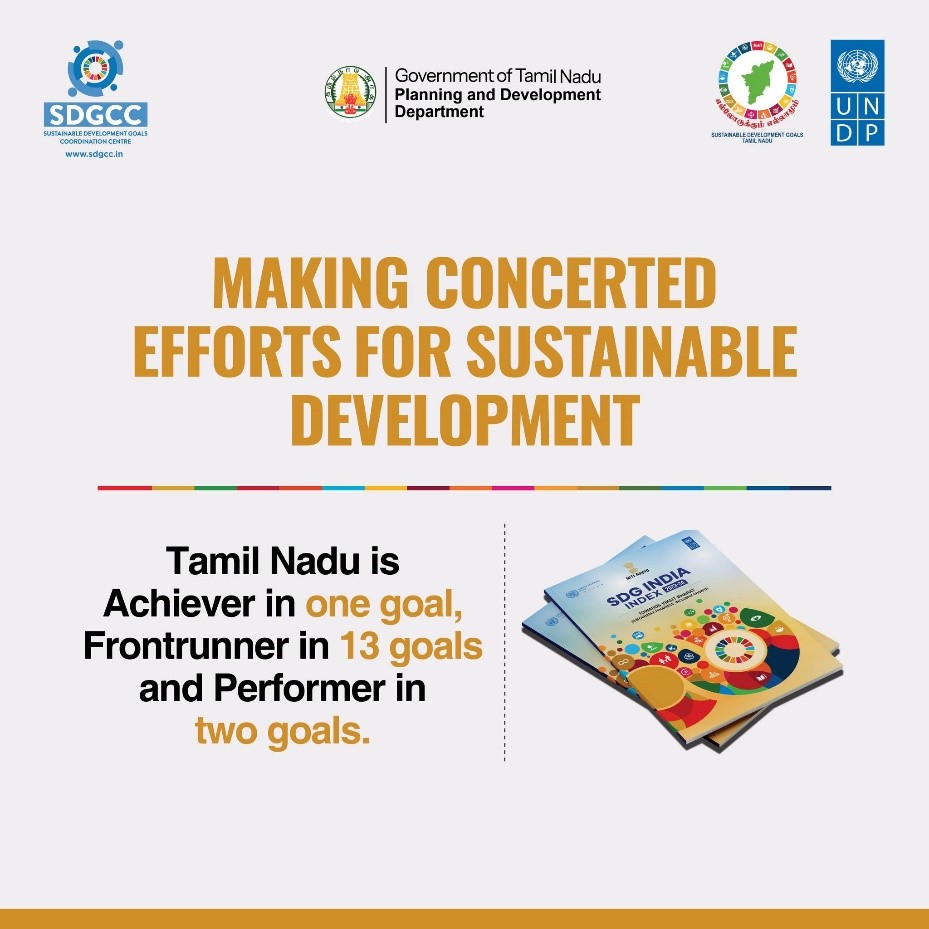
- Tamil Nadu has emerged as a frontrunner in this index, reflecting the state’s dedicated efforts and comprehensive policies aimed at sustainable development.
Tamil Nadu’s Composite Score
- The composite score for Tamil Nadu has increased to 78 in the latest edition.
- This represents a remarkable rise from 66 in 2018.
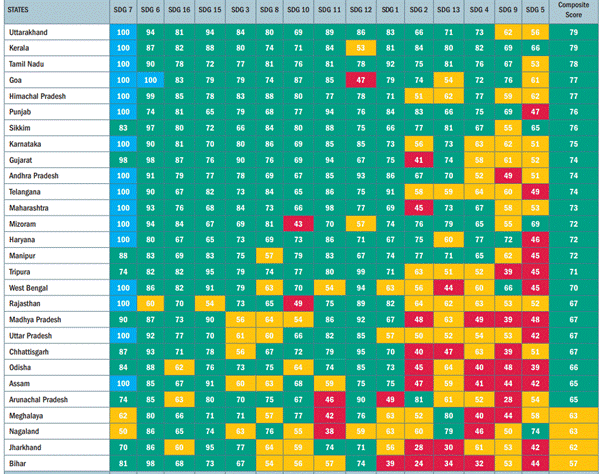
- This upward trajectory places the state among the top performers across the nation, underscoring its commitment to social equity, economic growth, and environmental sustainability.
Key Highlights of Progress
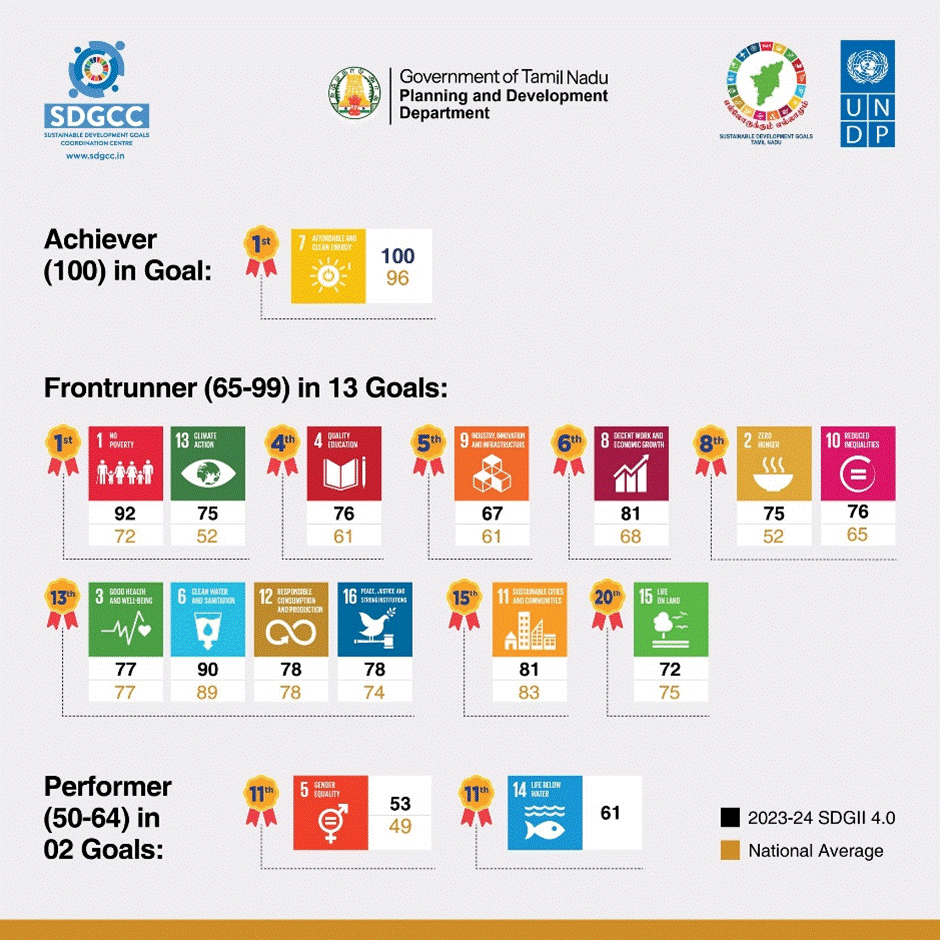
Goal 1 Index Score
- Overview
- The SDG Index Score for Goal 1 (No Poverty) ranges between 39 and 92 for States, and 58 to 89 for UTs.
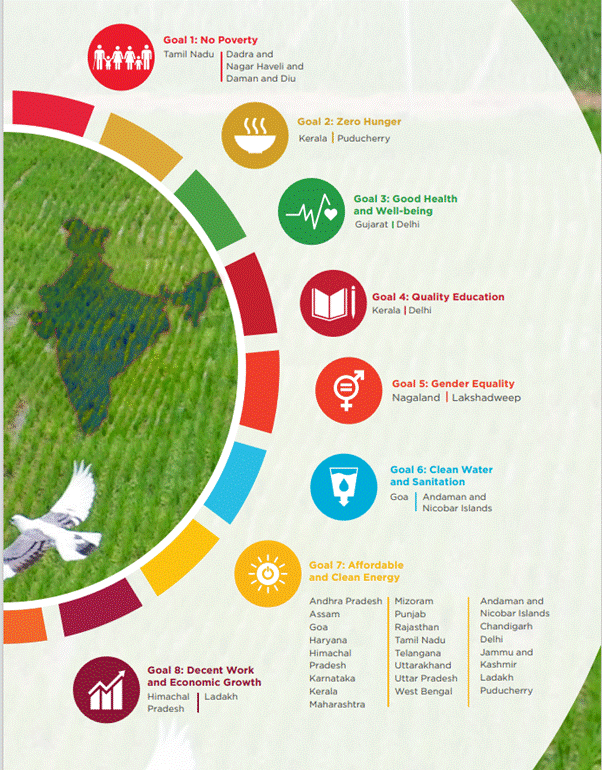
Top Performers
- States: Tamil Nadu (highest among states) and Dadra and Nagar Haveli and Daman and Diu (highest among UTs).
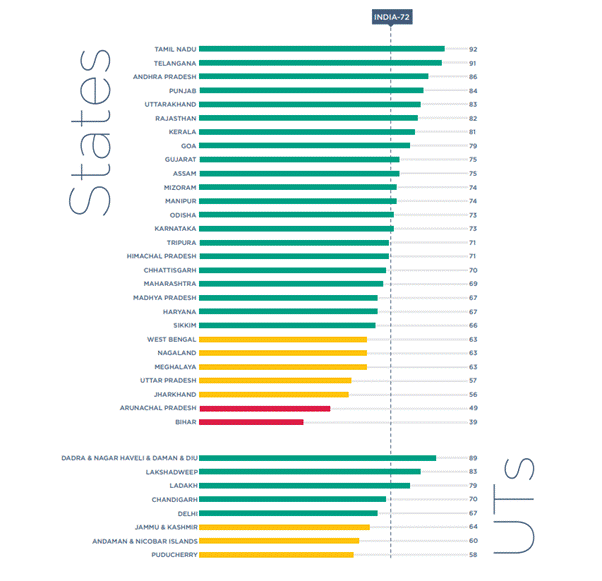
- Front Runners: 21 States and 5 UTs fall into this category (scores between 65 and 100, excluding 100).
- Aspirants: Two States scored less than 50, indicating areas needing improvement.
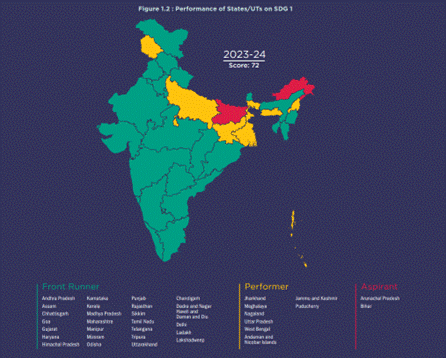
Good Health and Well-being (Goal 3)
- The state’s health initiatives have shown substantial results, with a reported institutional delivery rate of 97.18% in 2023-24.
- This achievement is attributed to enhanced healthcare infrastructure.
- Community health programs also play a crucial role by prioritizing maternal and child health.
- These initiatives ensure that all citizens have access to quality healthcare.
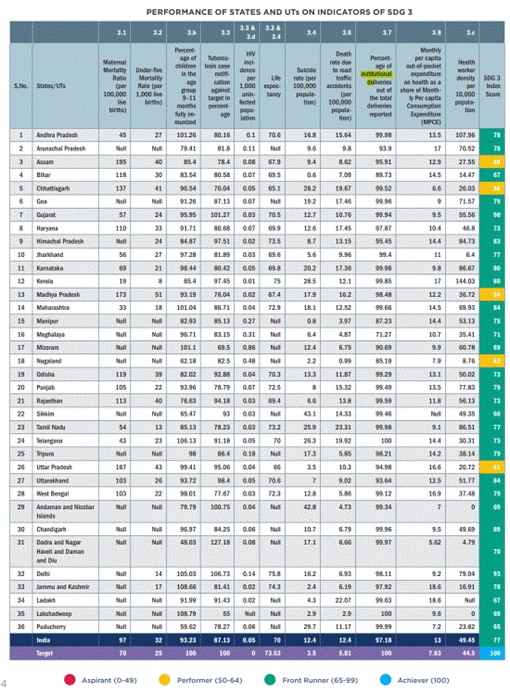
Decent Work and Economic Growth (Goal 8)
- Tamil Nadu has sustained its leadership in trade and industrial sectors.
- The state has implemented effective policies that enhance economic opportunities and promote sustainable livelihoods.
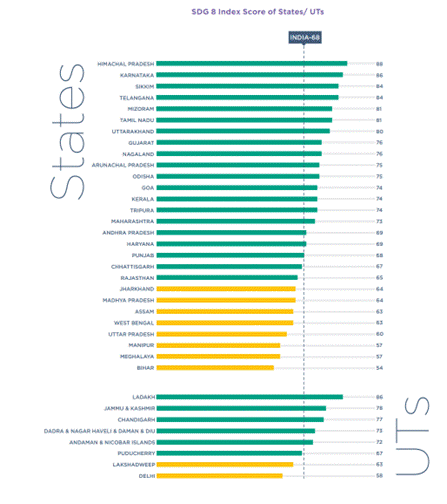
- Various skill development programs have been initiated, fostering entrepreneurship, and supporting job creation.
Goal 13 Index Score (Climate Action)
Overview
- SDG Index Score for Goal 13 ranges from 30 to 81 for States and 13 to 80 for UTs.
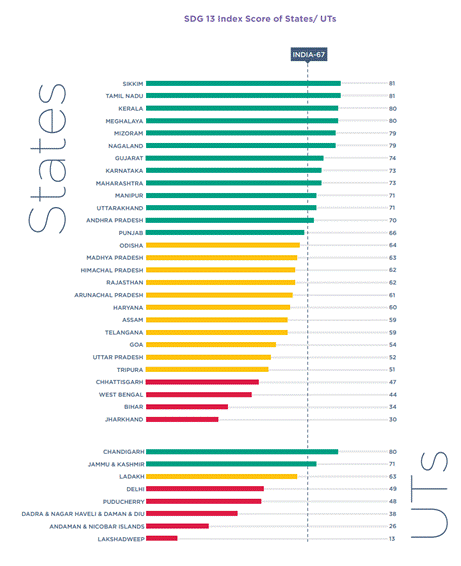
Top Performers
- States: Sikkim and Tamil Nadu.
- UT: Chandigarh.
Categories
- Front Runners: 13 States and 2 UTs with scores between 65 and 100 (excluding 100).
- Aspirants: Four States and five UTs scored less than 50.
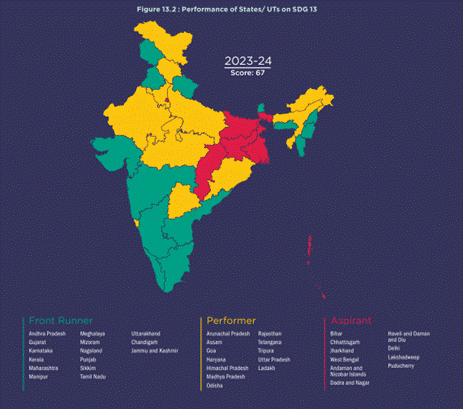
Life on Land (Goal 15)
- Tamil Nadu has prioritized environmental sustainability, with nearly 25% of its geographical area designated as forest cover.
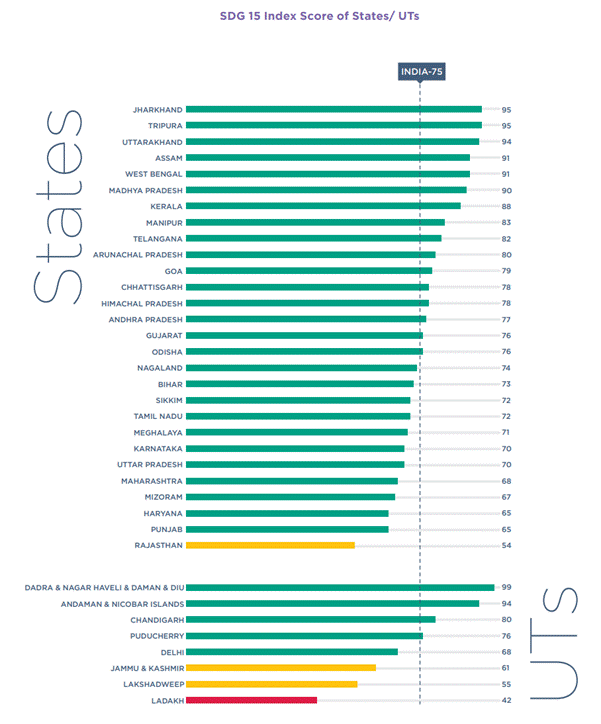
- This initiative contributes not only to biodiversity conservation but also plays a vital role in combating climate change through carbon sequestration and promoting ecological balance.
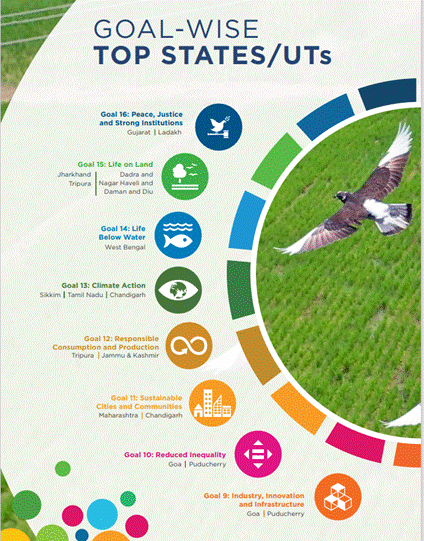
Government Initiatives Driving Change
- The Tamil Nadu government has rolled out several flagship initiatives aimed at accelerating progress on the SDGs, including:
- PMAY (Pradhan Mantri Awas Yojana): Targeting the construction of 4 million affordable housing units to ensure shelter for all citizens.
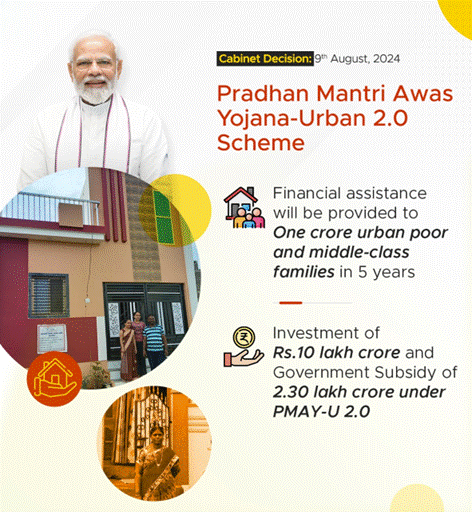
- Ayushman Bharat - PMJAY: Providing health insurance to over 300 million beneficiaries, enhancing access to essential health services.
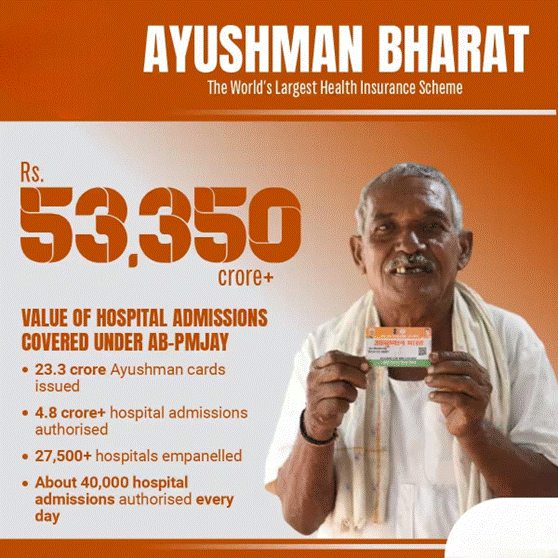
- Swachh Bharat Abhiyan: Facilitating the construction of 11 million toilets, thereby improving sanitation and hygiene across urban and rural areas.
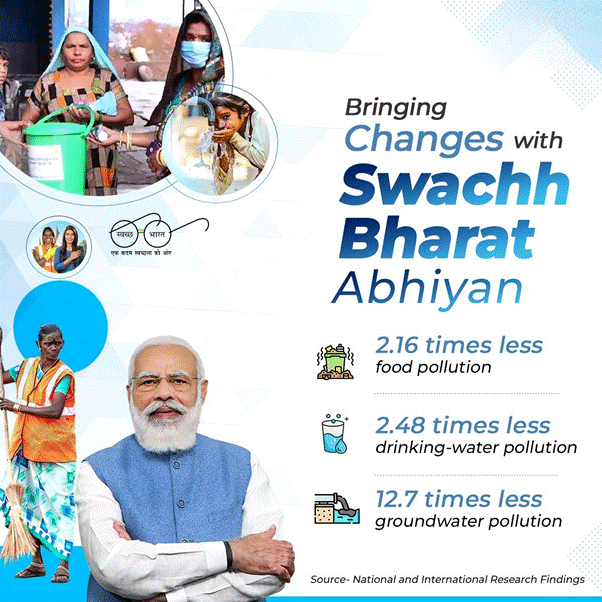
State's Performance and Future Commitments
- The SDG India Index 2023-24 reports Tamil Nadu as one of the 32 states and union territories achieving frontrunner status.
- This success reflects the state’s integrated approach towards sustainable development, fostering collaborative efforts across various sectors.
CSR Funding and Vulnerable Communities
- Challenges in CSR Funding
- Incentivizing CSR funding for the most vulnerable communities remains difficult.
- Despite an increase in CSR activities financed by India's private sector, the majority of funds are concentrated in states with significant private sector activities.
Top States for CSR Spending
- 1. Maharashtra: INR 23,947 crores
- 2. Karnataka: INR 8,993 crores
- 3. Gujarat: INR 7,809 crores
- 4. Tamil Nadu: INR 6,876 crores
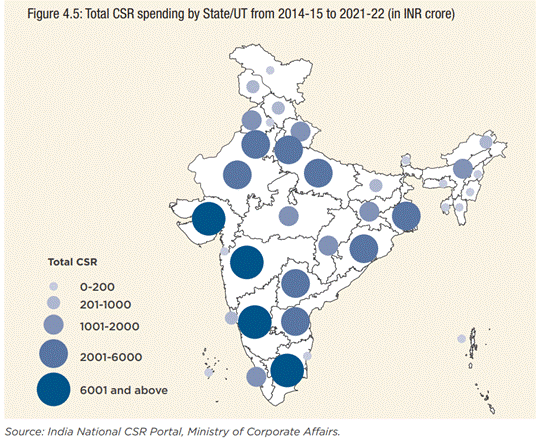
SDG Performance in India
- SDG India Index 2023-24 Overview
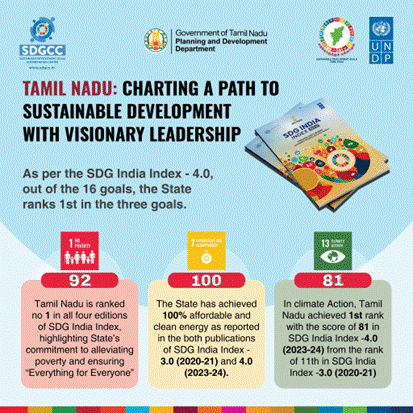
- State scores range from 57 to 79; Union Territories (UTs) range from 65 to 77.
- Improvement noted compared to 2020-21 scores (States: 52 to 75; UTs: 62 to 79).
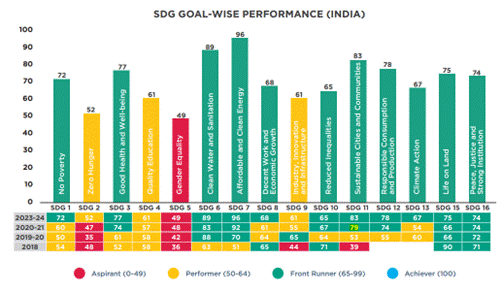
Top Performers
- States: Uttarakhand and Kerala lead with scores of 79.
- UTs: Chandigarh ranks highest with a score of 77.
- Other Notable States: Tamil Nadu (3rd), Goa, Himachal Pradesh.
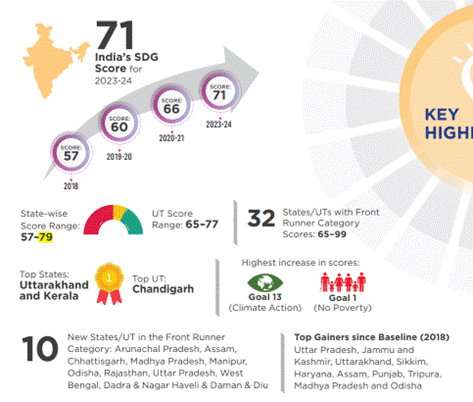
- Maternity Benefits
- PMMVY Coverage
- As of 2023–2024, 46.29% of enrolled beneficiaries received social protection benefits under the Pradhan Mantri Matru Vandana Yojana (PMMVY).
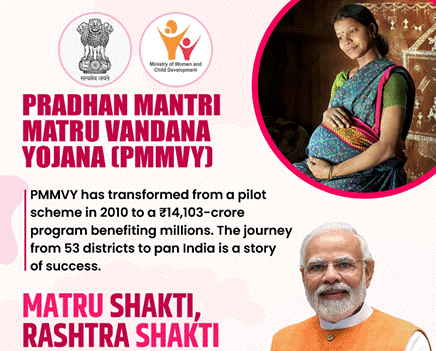
- Full Coverage Target: Efforts are ongoing to achieve complete coverage.
Top Achieving States and UTs
- States: Tamil Nadu and Punjab have reached 100% target.
- UTs: Ladakh and Dadra and Nagar Haveli and Daman and Diu have also achieved full coverage.
Maternal Mortality Ratio (MMR)
Current Status
- India’s MMR stands at 97 per 100,000 live births.
- The national target is set at 70 maternal mortalities per 100,000 live births by 2030.
- States Achieving the National Target Eight states have reached the target, with their respective MMR:
- 1. Kerala: 19
- 2. Maharashtra: 33
- 3. Telangana: 43
- 4. Andhra Pradesh: 45
- 5. Tamil Nadu: 54
- 6. Jharkhand: 56
- 7. Gujarat: 57
- 8. Karnataka: 69
Deaths Due to Road Accidents
- National Overview
- In 2022, the death rate due to road traffic accidents was 12 persons per 100,000 population.
State Statistics
- Highest Rate: Tamil Nadu with 23 deaths per 100,000.
- Lowest Rate: Nagaland with 1 death per 100,000.
States and UTs Achieving the Target
- States: Meghalaya (5), Manipur (4), Nagaland (1).
- UTs: Andaman and Nicobar Islands (5), Lakshadweep (3).
Enrolment Ratio in Higher Education
- National Overview
- Overall enrolment: 28.4 percent of students aged 18–23 years are enrolled in higher education.
Top Performers
- Tamil Nadu: 47 percent enrolment.
- Chandigarh: 64.8 percent among UTs (highest overall).
- Lowest Enrolment: Assam with 16.9 percent.
Trained Teachers
- National Overview
- Approximately 92.2 percent of teachers in secondary schools are trained.
Top States
- Tamil Nadu: 99.9 percent of teachers are trained (highest).
- Chandigarh: 99.1 percent among UTs.
Lowest Trained Teachers
- Meghalaya: 62 percent.
Infrastructure in Schools
- Current Status
- In 2021–2022, 88.65 percent of schools had access to basic infrastructure (electricity and drinking water).
Top Achievers
- Tamil Nadu and Goa: 100 percent access to infrastructure.
Lowest Performance
- Meghalaya: Only 20.5 percent of schools have access to both electricity and drinking water.
- UTs Achieving the Target
- Chandigarh, Delhi, Puducherry, Lakshadweep, and Dadra and Nagar Haveli and Daman and Diu have achieved the national target.
Groundwater Extraction
- Current Status
- Overall Extraction: In India, 59.26 percent of groundwater is extracted.
- This figure falls within the national target of 70 percent, which is deemed ‘safe’ by the Ministry of Jal Shakti.
Top Performer
- Arunachal Pradesh: 0.42 percent extraction.
States/UTs Exceeding Permissible Limits
- States with extraction above permissible limits include:
- Punjab: Worst performer at 163.76 percent extraction.
- Others: Haryana, Tamil Nadu, Rajasthan, Uttar Pradesh, Chandigarh, Delhi, Puducherry, and Dadra and Nagar Haveli and Daman and Diu.
Best Performing UT
- Andaman and Nicobar Islands: 1.37 percent extraction.
Women Account Holders under PMJDY
- National Overview
- As of March 2024, approximately 55.63 percent of account holders under the Pradhan Mantri Jan Dhan Yojana (PMJDY) are women.
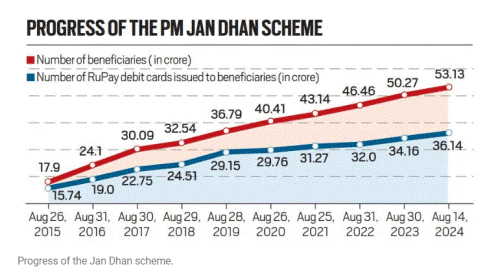
State Statistics
- Tamil Nadu: 58.59 percent of PMJDY account holders are women.
- Goa: Lowest share at 44.15 percent.
UT Statistics
- Puducherry: Highest percentage of women account holders at 56.68 percent.
- Delhi: Lowest at 37.07 percent.
Mangrove Coverage
- Current Status
- As per the India State of Forest Report 2021, there has been a 0.34 percent increase in mangrove-covered forest area in India.
Top Performer
- Karnataka: Highest increase at 30 percent.
States with No Increase
- Tamil Nadu and Kerala: Reported no increase in mangrove area.
Future Focus
- The Tamil Nadu government is committed to deepening its partnership with NITI Aayog in the localization and implementation of SDGs.
- The aim is to create a holistic framework that aligns developmental goals with community needs.
- This commitment is geared towards paving the way for a prosperous and sustainable Tamil Nadu by 2047.
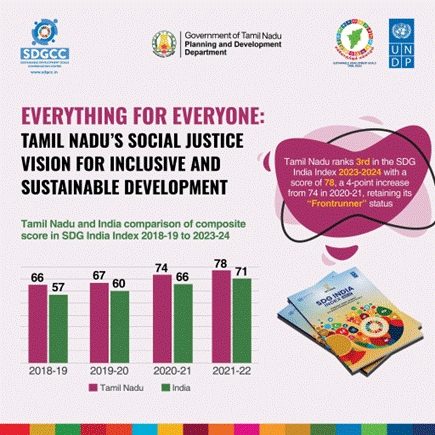
-------------------------------------


